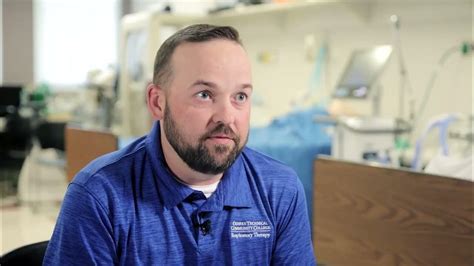Respiratory therapy technicians play a vital role in the healthcare system, often working behind the scenes to ensure patients receive the best possible care. These skilled professionals are responsible for assisting respiratory therapists and physicians in treating patients with respiratory disorders, such as chronic obstructive pulmonary disease (COPD), asthma, and pneumonia. In this article, we will explore five ways respiratory therapy technicians save lives and make a significant impact on patient outcomes.
Respiratory therapy technicians are essential members of the healthcare team, and their contributions should not be overlooked. By providing critical care and support, they help patients breathe easier, recover faster, and live healthier lives. From operating life-saving equipment to educating patients on proper breathing techniques, respiratory therapy technicians are dedicated to improving patient outcomes and saving lives.
The Importance of Respiratory Therapy Technicians
Respiratory therapy technicians work in various healthcare settings, including hospitals, clinics, and nursing homes. Their primary responsibility is to assist respiratory therapists and physicians in diagnosing and treating patients with respiratory disorders. These technicians are trained to operate complex medical equipment, such as ventilators, oxygen tanks, and nebulizers, which are essential for delivering life-saving treatments.

1. Operating Life-Saving Equipment
Respiratory therapy technicians are trained to operate a range of medical equipment, including ventilators, oxygen tanks, and nebulizers. These machines are critical for delivering life-saving treatments to patients with respiratory disorders. For example, ventilators provide mechanical breathing support to patients who are unable to breathe on their own, while oxygen tanks supply supplemental oxygen to patients with low oxygen levels.
By operating this equipment effectively, respiratory therapy technicians help ensure patients receive the oxygen they need to survive. They closely monitor patients' vital signs, adjust equipment settings as needed, and troubleshoot any technical issues that may arise. This attention to detail and technical expertise can mean the difference between life and death for patients with severe respiratory disorders.
2. Assisting with Diagnostic Tests
Respiratory therapy technicians assist respiratory therapists and physicians in conducting diagnostic tests, such as pulmonary function tests (PFTs) and arterial blood gas (ABG) analyses. These tests help healthcare professionals diagnose and monitor respiratory disorders, making it possible to develop effective treatment plans.
During PFTs, respiratory therapy technicians help patients perform breathing exercises, such as inhaling and exhaling into a spirometer. This device measures lung function, providing valuable insights into patients' respiratory health. By assisting with these diagnostic tests, respiratory therapy technicians play a crucial role in helping healthcare professionals diagnose and treat respiratory disorders.

3. Educating Patients on Proper Breathing Techniques
Respiratory therapy technicians educate patients on proper breathing techniques, which are essential for managing respiratory disorders. By teaching patients how to breathe effectively, these technicians help reduce symptoms, slow disease progression, and improve overall health outcomes.
For example, respiratory therapy technicians may teach patients with COPD how to use inhalers correctly, demonstrate proper breathing exercises, and provide guidance on how to conserve energy while performing daily activities. By empowering patients with the knowledge and skills they need to manage their respiratory health, respiratory therapy technicians play a vital role in improving patient outcomes.
4. Providing Emotional Support
Respiratory therapy technicians provide emotional support to patients and their families, which is essential for coping with the physical and emotional challenges of respiratory disorders. By offering a listening ear, words of encouragement, and reassurance, these technicians help reduce stress, anxiety, and fear, promoting a more positive and supportive care environment.
For patients with chronic respiratory disorders, the emotional toll of living with a life-limiting condition can be overwhelming. Respiratory therapy technicians help alleviate this burden by providing emotional support, answering questions, and addressing concerns. By doing so, they help patients feel more comfortable, confident, and empowered to manage their respiratory health.

5. Collaborating with Healthcare Teams
Respiratory therapy technicians collaborate with healthcare teams to develop and implement effective treatment plans. By working closely with respiratory therapists, physicians, and other healthcare professionals, these technicians help ensure patients receive comprehensive and coordinated care.
For example, respiratory therapy technicians may participate in multidisciplinary rounds, share patient data and observations, and contribute to care conferences. By collaborating with healthcare teams, these technicians help identify potential complications, develop strategies for preventing adverse events, and optimize patient outcomes.






Conclusion
Respiratory therapy technicians play a vital role in the healthcare system, working tirelessly to ensure patients receive the best possible care. By operating life-saving equipment, assisting with diagnostic tests, educating patients on proper breathing techniques, providing emotional support, and collaborating with healthcare teams, these technicians make a significant impact on patient outcomes.
As we conclude this article, we hope you have gained a deeper appreciation for the critical work of respiratory therapy technicians. These dedicated professionals are the unsung heroes of the healthcare system, working behind the scenes to save lives and improve patient outcomes. By recognizing their contributions and supporting their work, we can all play a part in ensuring patients receive the highest quality care possible.
What is the role of a respiratory therapy technician?
+A respiratory therapy technician assists respiratory therapists and physicians in diagnosing and treating patients with respiratory disorders.
What type of equipment do respiratory therapy technicians operate?
+Respiratory therapy technicians operate a range of medical equipment, including ventilators, oxygen tanks, and nebulizers.
How do respiratory therapy technicians educate patients?
+Respiratory therapy technicians educate patients on proper breathing techniques, demonstrate how to use inhalers correctly, and provide guidance on how to conserve energy while performing daily activities.
